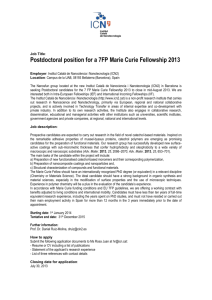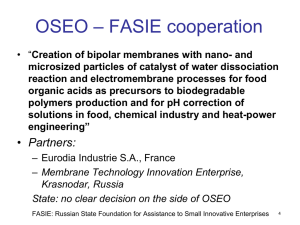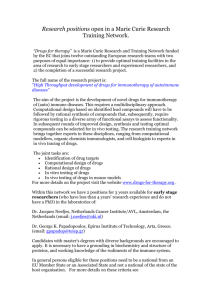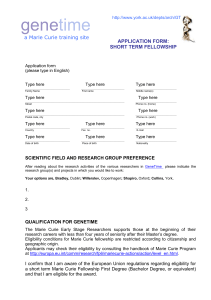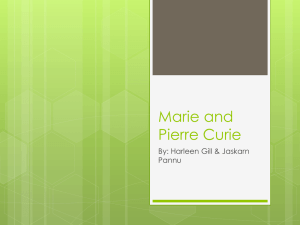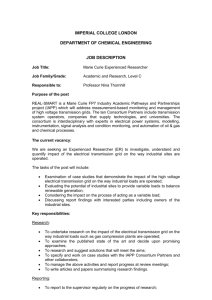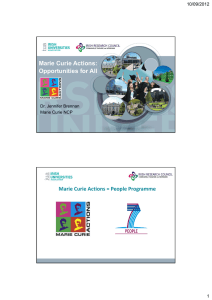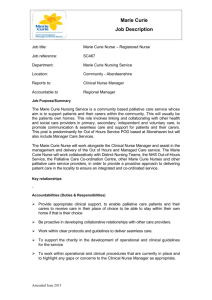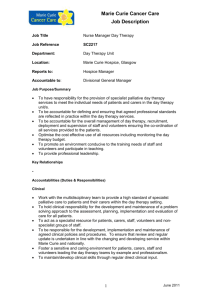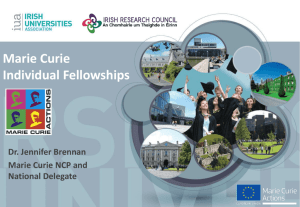Job Description
advertisement
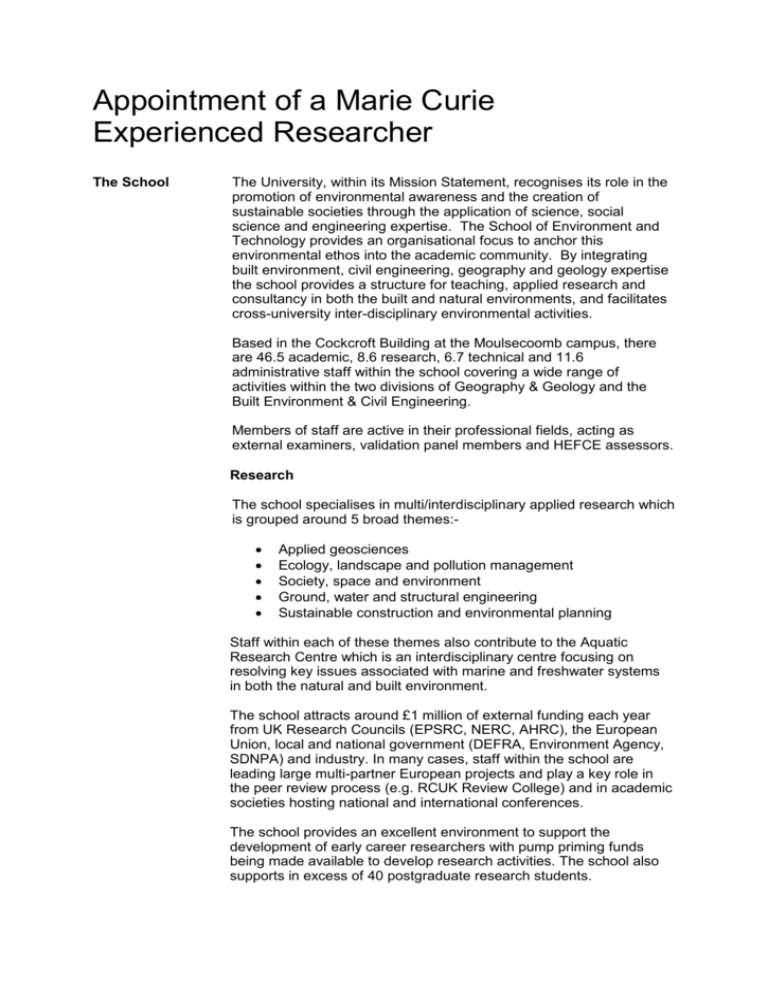
Appointment of a Marie Curie Experienced Researcher The School The University, within its Mission Statement, recognises its role in the promotion of environmental awareness and the creation of sustainable societies through the application of science, social science and engineering expertise. The School of Environment and Technology provides an organisational focus to anchor this environmental ethos into the academic community. By integrating built environment, civil engineering, geography and geology expertise the school provides a structure for teaching, applied research and consultancy in both the built and natural environments, and facilitates cross-university inter-disciplinary environmental activities. Based in the Cockcroft Building at the Moulsecoomb campus, there are 46.5 academic, 8.6 research, 6.7 technical and 11.6 administrative staff within the school covering a wide range of activities within the two divisions of Geography & Geology and the Built Environment & Civil Engineering. Members of staff are active in their professional fields, acting as external examiners, validation panel members and HEFCE assessors. Research The school specialises in multi/interdisciplinary applied research which is grouped around 5 broad themes: Applied geosciences Ecology, landscape and pollution management Society, space and environment Ground, water and structural engineering Sustainable construction and environmental planning Staff within each of these themes also contribute to the Aquatic Research Centre which is an interdisciplinary centre focusing on resolving key issues associated with marine and freshwater systems in both the natural and built environment. The school attracts around £1 million of external funding each year from UK Research Councils (EPSRC, NERC, AHRC), the European Union, local and national government (DEFRA, Environment Agency, SDNPA) and industry. In many cases, staff within the school are leading large multi-partner European projects and play a key role in the peer review process (e.g. RCUK Review College) and in academic societies hosting national and international conferences. The school provides an excellent environment to support the development of early career researchers with pump priming funds being made available to develop research activities. The school also supports in excess of 40 postgraduate research students. All staff are expected to inform their teaching curriculum development from active research and current scholarship. They may expect to manage their own research with a view to obtaining funding, publishing and presenting quality papers regularly, incorporating research into courses and contributing to the university’s wider research community. The research duties may include the supervision of research students and assistants across the spectrum of related research. liaise with others in similar work within the school to advance the subject area. to engage in scholarly activity in order to ensure the division maintains and enhances its professional reputation. to liaise with external organisations and institutions both nationally and abroad. There is a friendly and supportive research student community in the school and strong links to researchers at other universities and other research-focused organisations. Details are listed in the divisional sections. Courses The school offers a wide range of courses to over 1300 students at Masters and Undergraduate Degree level which cover the subject areas of architectural technology, building surveying, construction management, civil engineering, environmental sciences, geography, geology and environmental management. The undergraduate programmes are modular in structure and split into two semesters of 15 weeks’ duration. All of the courses make use of fieldwork and industrial placements and these are integrated into the teaching programme. Many of the courses are accredited by professional bodies (ICE, RICS, IEMA, Geol Soc) and have key transferable skills integrated into the programme. As a consequence the graduating students have an excellent record in securing appropriate employment. Staff within the school also have close links with industry, the local community and the relevant professions, with highly qualified staff offering consultancy, short courses and CPD opportunities to the South East region. Consultancy Opportunities Staff may also work on consultancy activities, which may be undertaken in consultation with their Head of School. Facilities The school is strongly supported by the university and as a consequence has seen significant investment (£500,000) in laboratories and capital equipment over the last five years. Key facilities include: Geochemical suite (XRD, XRF, XPS, AAS, ICP-OES, ICP-MS) Geology Laboratory Environmental Sciences Laboratory Public Health Laboratory Hydraulics laboratory with 6 flumes Experimental River basin Heavy Structures Laboratory Geotechnical laboratory including a large-scale geotechnical centrifuge Concrete laboratory Drawing Studio Computer Laboratories including AutoCad and GIS Surveying Equipment (Total Stations, dGPS) Field based monitoring equipment including a 4 wheel drive vehicle and coring equipment Instrumented monitoring sites for hydrogeology, wetlands and estuarine environments. The refurbishment of the Cockcroft Building (a £29 million project) is currently taking place and as a consequence the school is expected to move into dynamic refurbished accommodation in the current academic year. Support Staff The academic activities are supported by a range of administrative and technical staff. The laboratories and computer systems are supported by highly qualified technical instructors who support teaching and research activities. Similarly the teaching and research administrative activities are supported by the School Office together with two Student Support Tutors. In addition the school has a dedicated Business Development Officer and can call upon support from the Centre for Collaboration and Partnership which focuses on working with industry (KTPs) and student placements. The Job The Marie Curie Industry-Academia Partnerships and Pathways "IAPP" (FP7-PEOPLE-2013-IAPP-612250) focuses on the development of novel materials and technologies for the remediation of contaminated soils and groundwaters from man-made contaminants, via combined nanosorbent, bioremediation and electrochemical oxidation approaches. The Industry-Academia character of the project is clearly defined by its partners including academic institutes and industry partners from the Slovak republic, Greece, United Kingdom and Kazakhstan. The researcher will assist in the development and performance testing of nanoparticle-based sorbents and catalysts developed during the WasClean (“Water and Soil Clean-up from mixed contaminants”) project. In particular, they will examine the environmental behaviour and toxicity risk of the nanomaterials developed and tested during the project. They will also engage in dissemination activities relating to the WasClean project. Marie Curie Experienced Researchers (Research Officer with 4-10 years of experience) At Research Fellow level (AC2), staff are expected to be involved in the developing, planning and managing of research projects in consultation with a Principal Investigator, to develop a publication record, learn to generate funding and supervise less experienced researchers. The role will require a level of research knowledge, skill and experience equivalent to PhD. Research Fellows may also be expected to contribute to teaching and/or consultancy activities, in order to ensure continuous development of knowledge in the subject area. Marie Curie Experienced Researchers are expected to: hold a relevant doctoral degree (MPhil/PhD) or good master level qualification and appropriate experience To play a leading role in the project in collaboration with the project team. This includes: setting objectives and timescales; planning effective methods and resources for robust research; ensuring valuable outcomes, maximum efficiency and that the project remains within budget; reporting and fully explaining any unavoidable delays to all interested parties. Undertake experiments using standard techniques and methods and develop the ability to design experiments and methods appropriate to the research project; Plan own day-to-day research activity within the framework of the agreed programme, co-ordinating with the work of others; Liaise with research colleagues, project partners and support staff on routine matters and to gather or exchange information To evaluate the information to be used and ensure the research is robust and the conclusions justifiable. To investigate the reasons for any failure to achieve objectives and explain them to all interested parties, where possible turning setbacks into new opportunities or recommendations for further study. To ensure accurate and complete records of all findings, results and views and the interpretation placed upon them, with the rationale for conclusions and recommendations fully justified with reference to the results themselves. To further develop and refine presentation skills and to present research information in an appropriate manner to interested parties, including contribution to curriculum development and some teaching on courses Deal with problems which may affect research objectives and contribute to decisions affecting the work of the team; Analyse and interpret results of own research and generate original ideas based on outcomes; May assist on collaborative projects by tracking progress in each institution against grant requirements; Write up results of own research and contribute to the production of research reports and publications; Complete dissemination of research output, for example by assisting with the design and development of a website, exhibition or broadcast media programme; Prepare and present information/papers on research progress and outcomes to bodies supervising research, e.g. steering groups or the funding body; Attend and contribute to meetings including production of minutes; Continue to update own subject knowledge and develop research skills; Assist in the supervision of student projects and provide guidance to support staff and any research students who may be assisting with the research; May contribute to introductory courses including preparing and delivering lectures and marking with guidance or developing others' expertise in the use of research methods and equipment; Develop own knowledge of teaching and learning methods; Make internal and external contacts to develop knowledge and understanding and form relationships for future collaboration. Knowledge and Qualifications It is a condition of the funding that candidates should have a doctoral degree (although a good masters degree with relevant experience may suffice). It is also essential to have between 4 and 10 years’ research experience. In addition, candidates must not have spent more than 12 months in the country of the host/recruiting institution (the UK in this instance) in the three years prior to selection. In addition, candidates will be expected to meet the following criteria: Fluent in spoken and written English (IELTS certificate, 6.5; with a score in writing of 6.0 and nothing lower than 5.5). Able to demonstrate excellent communication skill and team working mind-set. At least a second class Honours Bachelor degree or equivalent in Geology, Environmental Science, Chemistry or related fields. A determination in pursuing a research career in regenerative medicine. Sufficient, up to date breadth or depth of specialist knowledge in the discipline. Research experience/expertise and developing further skills in and knowledge of research methods and techniques Understanding of equality of opportunity, academic content and issues relating to student need. Competent IT skills. Hours of work The salary This post is full-time. The nature of research posts is such that staff are expected to work such hours as are reasonably necessary in order to fulfil their duties and responsibilities. It would therefore be inappropriate to define the total hours to be worked in any week. A reasonable norm for full-time staff, however, having regard to the contractual position of other senior staff in the institution, would be thirty-seven hours per week, although this should not be regarded as a minimum or maximum. Contribution to teaching and learning programmes in the school should not exceed six hours in any week. The remuneration will be in line with the EC rules for Marie Curie grant holders (Experienced Researchers, FP7-PEOPLE-2011-IAPP). http://ec.europa.eu/research/mariecurieactions/index.htm Salaries are paid monthly in arrears through the BACS System directly into the bank or building society account of each member of staff. The university must pay salaries through the BACS system. They cannot be paid by cheque. It will therefore be important to supply account details in order to ensure prompt payment. Duration of the job Conditions of funding: Holidays The appointment is fixed term for 12 months due to the period of funding. It is a condition of the funding that candidates must not have commenced awarded a doctoral degree and have less than four years’ research experience. In addition, candidates must not have spent more than 12 months in the country of the host/recruiting institution (the UK in this instance) in the three years prior to selection. The annual leave entitlement is 35 working days pro rata for proportional full-time staff. This is in addition to the statutory holidays applicable in England, local discretionary holidays and days when the university is closed in the interests of efficiency. Terms & conditions In determining terms and conditions of employment, the university has regard to recommendations made through the appropriate national negotiating framework. These terms and conditions of service can be varied by local agreements reached through the university’s local negotiating framework which comprises a Joint Negotiating Committee supported by two Common Interest Groups. These groups bring together representatives of the university and its recognised trade unions, which are: • • Strategic plan UCU – University and College Union UNISON Details of our Strategic Plan can be found at: http://staffcentral.brighton.ac.uk/xpedio/groups/Public/documents/staff central/doc013747.pdf
